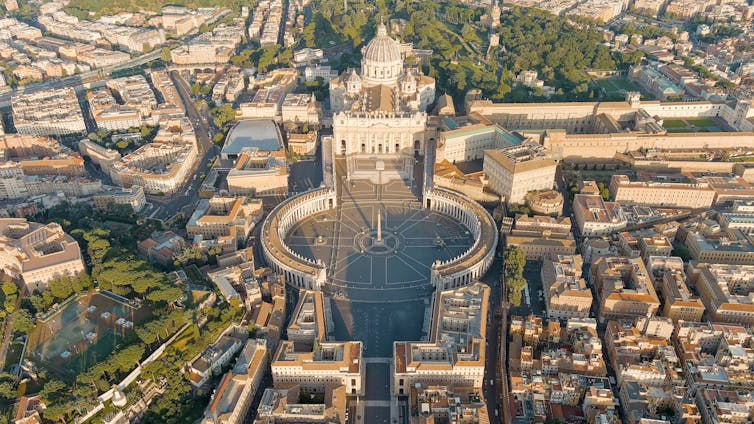King Charles’s recent visit to the Vatican may appear to be simply a symbolic gesture of ecumenical goodwill. But moments like this provide an opportunity to look at the long-term consequences of church-state relations around the world.
Britain, of course, has a complicated history with the Catholic church. Edward VII (Charles’s great-great-grandfather) was the first UK monarch to visit the Vatican since the Protestant Reformation in the 16th century.
The UK (and much of western Europe) is largely secular today, but this is a global exception: 85% of the world’s population identifies as religious. These beliefs are often passed down through generations, not necessarily chosen freely.
Today’s religious identities have more to do with political decisions made centuries ago than with personal faith. Spain and Portugal are predominantly Catholic not because of the individual choices of their population, but because their monarchs aligned (and maintained the hegemony) of the Roman Catholic church-state. In England, on the other hand, King Henry VIII broke away from Rome in the 1530s, challenging (“protesting”) against the universal papal authority and leading to the establishment of the Church of England.
This religious split also carried over to former colonies. Compare the US, (a Protestant country) to Mexico or Brazil (Catholic countries), and you’ll see the long shadow of these old decisions. My research shows the profound and lasting consequences of religion on these societies.
Diverging nations
In my book Ye Shall Know Them by Their Fruits, I analysed data from 65 countries across Europe and the Americas using both qualitative and quantitative methods.
My findings suggest that countries with historical and legal alignments with the Catholic church — such as Spain, Portugal, Austria, Ireland and much of Latin America — tend to underperform on a number of metrics, including inequality and education, and have more political corruption compared to states that maintained institutional separation (such as through the Protestant Reformation). Historical Protestant countries include the UK, Switzerland, Scandinavian and North American countries.
In particular, countries with strong traditional links to the Catholic church tend to exhibit higher levels of corruption and inequality. They also perform weaker in education, sustainability and competitiveness compared to Protestant countries.
Prosperity and educational differences between Protestants and Roman Catholics are evident even within countries. In Switzerland, the Protestant cantons (such as Geneva and Zurich) are currently the most competitive, while the Roman Catholic cantons (such as Ticino and Valais) are the least competitive. In Germany, Protestants are more educated (0.8 years more) and more prosperous (5.4% higher income) than Catholics.
Differences in economic prosperity and education are even higher comparing data across Protestant and Catholic countries.
Before the Reformation, literacy in England was below 10%, and the Roman church largely monopolised education. The Protestant emphasis on individual reading – especially of the Bible – dramatically increased literacy rates and access to knowledge. This paved the way for broader democratic participation, industrialisation and innovation.
Protestantism similarly proved influential in historical law revolutions, gradually separating society from feudal institutions and papalist medieval canon law.
In Britain, the Reformation was not just a theological shift, but a political one, breaking institutional ties with Rome and affirming national sovereignty. The long-term effects of that decision have echoed through the UK’s democratic and economic development.
Church-state relations
The Vatican’s political influence is often underestimated. The Roman Catholic church is the only religious body that is, at the same time, a sovereign political state – with ambassadors, diplomatic immunity and seats at international forums. The pope holds absolute executive, legislative and judicial authority.
Many of today’s Catholic-majority countries maintain formal relations with the Roman See through bilateral treaties called concordats. These agreements exert the power of the church in countries that have them, and are rarely democratically consulted with the population.
In Colombia, for example, concordats throughout history have linked religion and politics, have given church-influenced groups power over the economy, and allowed Rome to control what is taught in public and private education at all levels.
Since then, liberal efforts have reestablished much of the state’s power. But the effects are still evident in the strong cultural identity and presence of Catholicism in the country. Colombia has one of the highest proportions of adults raised as Roman Catholics in the world (92%), after Paraguay (94%).

Historically, informal gestures of religious diplomacy have laid the groundwork for further cooperation and formal agreements with Rome.
But King Charles’s recent Vatican visit is more diplomatic than anything. It reflects modern efforts to maintain and strengthen state-to-state relations and discuss shared global concerns like climate change and peacebuilding.
It is for this reason that the king’s visit matters – not because a formal treaty is on the table, but because it shows the strength of the UK’s experience since the Reformation. An exemplary model of the success of church-state separation, British democracy and prosperity have thrived for centuries – without formal entanglements with the Catholic church.
Dr Jason Garcia-Portilla earned his PhD in Organization Studies and Cultural Theory at the University of St. Gallen (Switzerland), financed with a Swiss Government Excellence Scholarship–ESKAS. Additionally, he holds an MSc in Climate Change and Policy from the University of Sussex in the UK (funded by the British Chevening Scholarship).
This article was originally published on The Conversation. Read the original article.







